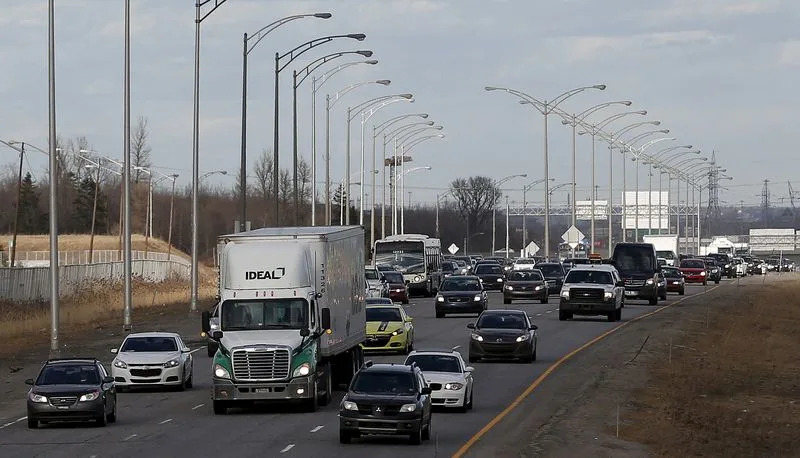TRANSITION TO HYBRID POSSIBLE BY THEN
Tue, December 19, 2023

Cars are pictured in traffic on Capitale highway in Quebec City
By David Ljunggren
OTTAWA (Reuters) -Canada on Tuesday released final regulations mandating that all passenger cars, SUVs, crossovers and light trucks sold by 2035 must be zero-emission vehicles (ZEVs), part of the government's overall plan to combat climate change.
ZEVs must make up at least 20% of all cars sold by 2026 and at least 60% by 2030. Industry officials say electric vehicles (EVs) represented 12.1% of new vehicle sales in the third quarter of 2023.
Environment Minister Steven Guilbeault said the regulations provided industry with the certainty it needed to address the issue of limited availability of EVs.
"(This) ensures Canadians have access to our fair share of the global supply of these vehicles," he told a televised news conference in Toronto.
Transportation accounts for about 22% of Canada's greenhouse gas emissions.
The rules are similar to those adopted by California, which says 100% of new cars sold in 2035 must be plug-in hybrid electric vehicles (PHEV), EVs or powered by hydrogen fuel cell. A total of 17 U.S. states have agreed to adopt the regulations.
Global EV sales now make up about 13% of all vehicle sales and are likely to rise to between 40%-45% of the market by the end of the decade, according to the Paris-based International Energy Agency.
According to the data platform Statista, Tesla accounted for 36.7% of EV sales in Canada in 2022, with Hyundai in second place with 11.1%.
The Canadian automobile industry says the regulations are too ambitious, noting the higher cost of electric vehicles.
It also complains that the charging network is incomplete, especially in rural areas. Canada, the world's second largest country, has a population of just 40 million people.
"Achieving higher ZEV sales levels depends on favorable market conditions, stronger consumer purchase incentives ... widespread charging infrastructure (and) expanded grid capacity," said Brian Kingston, President of the Canadian Vehicle Manufacturers’ Association.
The government's charging effort is focused on building EV ports in populous public areas and multi-family residential buildings, which experts warn may not be enough to rapidly increase adoption.
In an effort to address complaints that EVs are impractical in remote and northern areas, where cold conditions can cut the efficiency of batteries, PHEVs with an all-electric range of 80 km or more will remain eligible for sale in 2035 and beyond.
Canada has missed every emissions reduction target it has ever set. Prime Minister Justin Trudeau says fighting climate change is one of his Liberal government's top priorities.
His emissions reduction plan is flawed and will not reach the target of cutting greenhouse gas output by 40% to 45% below the 2005 level by 2030, a top watchdog said last month.
(Reporting by David Ljunggren; Editing by David Gregorio)
CCS C02 USED FOR FRACKING
Wed, December 20, 2023
By Nia Williams
Dec 20 (Reuters) - The Canada Growth Fund (CGF), a federal clean-tech financing agency, on Wednesday said it would invest C$200 million ($149.72 million) in carbon capture and storage developer Entropy Inc and backstop carbon credit prices for the first time.
Under the terms of the 15-year deal, known as a carbon credit offtake (CCO) commitment, the CGF has agreed to buy up to 1 million tonnes a year of carbon credits generated by Calgary-based Entropy, a subsidiary of oil and gas producer Advantage Energy.
The initial commitment will enable Entropy to sell up to 185,000 tonnes a year of credits, generated by the second phase of a carbon capture and storage project at Advantage's Glacier gas plant in Alberta, to the CGF at a price of C$86.50 per tonne.
Last year the company also agreed a C$300 million investment deal with infrastructure firm Brookfield.
"By creating a large-scale CCO to guarantee long-term carbon pricing and adding C$200 million to our existing Brookfield funding for third-party projects, Entropy has a clear path to accelerating growth and reducing emissions, right here at home," Entropy CEO Mike Belenkie said in a statement.
The CGF is a C$15 billion body set up last year by Canada's Finance Ministry to help attract private investment in clean tech by mitigating financing risks.
Ottawa has been working on ways to provide carbon price certainty to firms looking to invest in carbon capture and storage to reduce their emissions, in addition to providing investment tax credits.
Canada is the world's fourth-largest crude producer and the oil and gas sector is its highest-polluting industry, accounting for more than a quarter of all emissions.
National Bank analysts said the deal was a "massive milestone" for Entropy. Dale Beugin, executive vice president with the Canadian Climate Institute, said the investment will help minimize risk in clean growth projects and make carbon pricing work better in Canada.
"By guaranteeing value for Entropy Inc's carbon credits, this investment drives emissions reductions, without crowding out private investment," Beugin said.
($1 = 1.3358 Canadian dollars) (Reporting by Nia Williams; Editing by Michael Perry)
No comments:
Post a Comment